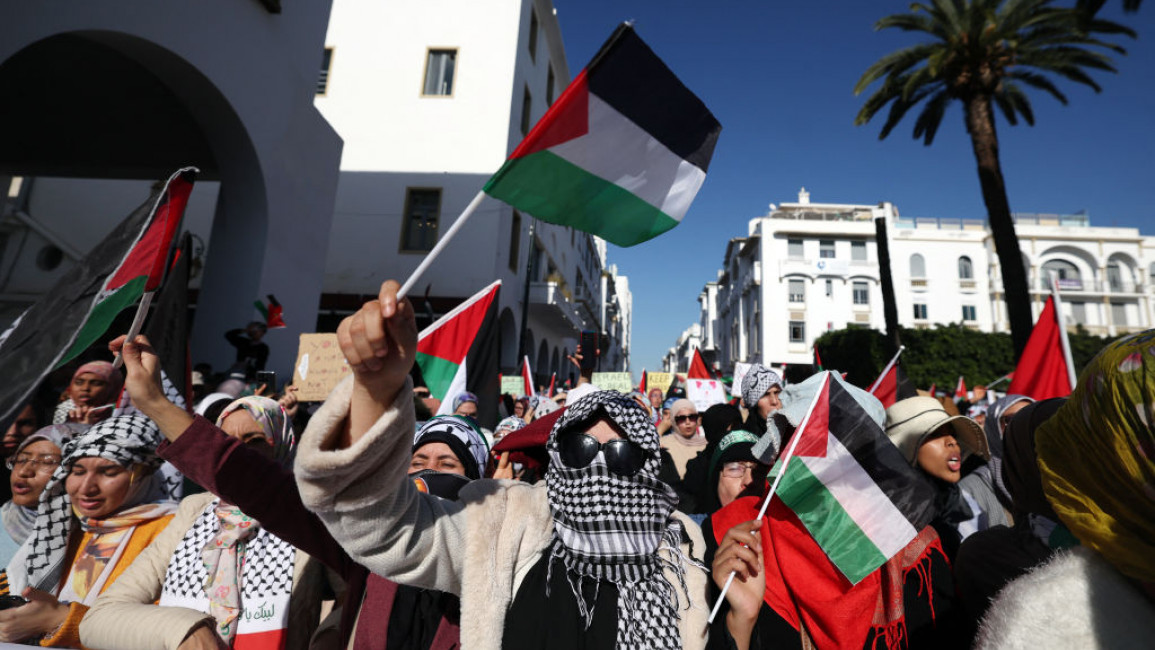Morocco's key Abraham Accords signatory, PJD, now joins anti-normalisation movement
In Morocco, activists, citizens and former officials are determined to bring down the normalisation and force the closure of the Israeli liaison office, despite Rabat's nonchalant policy vis-à-vis the growing anti-normalisation demands.
All over the North African kingdom, thousands of protesters took to the streets Sunday, 10 December, to condemn the ongoing "holocaust" against the Palestinian people in Gaza.
In Rabat, the usual calmness of the capital's Sunday mornings was interrupted by loud and angry chants of the marching crowd in Mohammed V square -the same square closed three years ago for the singing of the normalisation accord.
The nearby buildings - occupied mainly by lawyers and doctors' offices - joined the march from their windows, waving the Palestinian flags and chanting for an immediate ceasefire.
The National Group for Palestine, the local pro-Palestine group behind the protest, set three signing points for protesters to add their names to a nationwide petition demanding cutting off ties with Tel Aviv.
"Revoking normalisation is a basic demand that must be implemented, and we are continuing with our demands as Moroccans, and we will not stop until they are fully achieved," Abdel Qader Al-Alami, a member of the National Action Group for Palestine, told The New Arab.
Two days after the eruption of pro-Palestinian protests in the country on 15 October, Israeli officials in Rabat were evacuated to Tel Aviv.
A spokesman for the Israeli Foreign Ministry has denied the closure of the Israeli liaison office in Rabat, arguing that Tel Aviv "took measures related to temporary circumstances."
Rabat did not comment.
The PJD once signed normalisation, now marches against it
Meanwhile, Mustafa Al-Khalfi, former media minister and member of the Justice and Development Party (PJD), has also joined the protest, marking the first time a former official of the PJD government joined a public anti-normalisation protest.
"Moroccans today express with one voice their comprehensive and absolute solidarity with the Palestinian people and their resistance in the battle for existence," he told reporters during the protest.
The PJD was a crucial player in the signature of the normalisation accord with Israel.
On 22 December 2020, Salah Eddin El-Othmani, at the time head of the government and the PJD, signed the normalisation accord with Jared Kushner, the former US president's adviser, and Meir Ben-Shabbat, Israel's National Security Adviser.
After a tragic loss in the 2021 elections, mainly attributed to their role in the normalisation, the PJD has admitted their fault, arguing that they were "under pressure".
However, the party's key officials have continued to avoid attending pro-Palestine protests, reportedly fearing confrontation with angry citizens.
Later on Sunday, another pro-Palestine march started in Casablanca. Thousands of civilians, activists, and politicians, including renowned members of BDS Morocco and the socialist parties in the North African state, joined the rally.
Protesters in Casablanca have also called for the release of imprisoned Moroccan journalists and activists as they chanted for dignity and freedom for both Moroccan and Palestinian people.
"For the past years, we have recorded several human rights setbacks, which perpetuate domination and authoritarianism and close the door to any shift towards a state of rights and freedoms," said Boubacar Al-Wankhar, a member of the National Front against the normalisation, during the protest.
The pro-Palestine rallies coincided with the International Day of Human Rights, a day typically marked by high-level political conferences and widespread protests around the globe.
They also coincided with the day Donald Trump, President of the United States at the time, announced, on X, the platform formerly known as Twitter, that Rabat and Tel Aviv will sign a normalisation deal under the US auspices.
Morocco and Israel are set to celebrate the fourth anniversary of signing the normalisation accord on 22 December.
Rabat, which has condemned violence on both sides amid the Gaza war, has yet to comment on the status of its relationship with Tel Aviv.


![President Pezeshkian has denounced Israel's attacks on Lebanon [Getty]](/sites/default/files/styles/image_684x385/public/2173482924.jpeg?h=a5f2f23a&itok=q3evVtko)



 Follow the Middle East's top stories in English at The New Arab on Google News
Follow the Middle East's top stories in English at The New Arab on Google News


